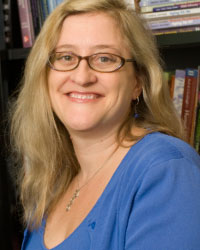Investigations
Making Memory Stick
Study explores how we remember all the things we need to do
Everyone has memory lapses. We make a mental note on the way to work to pick up the dry cleaning on the way home, but when 5 p.m. rolls around, we zip right past the cleaners with nary a thought about the suits and dresses that wait patiently for us to claim them.
Scientists call it prospective memory—the act of remembering something that we need to do. Studies show, too, that the older people get, the harder it is for them to remember to complete an intended action.
Rebekah Smith, an assistant professor of psychology at UTSA, now has a $1 million grant from the National Institutes of Health to learn how this function of the human mind works and to understand the differences between younger and older adults when it comes to event-based prospective memory. She plans to use the research to develop and test tools that may help older adults remember the tasks they need to accomplish.
"The real question is, how do we remember to do something later, and how do I do that at the right time," Smith said. "We have demonstrated that older adults have a more difficult time with prospective memory than younger people. Why are older adults performing these tasks differently?"
Smith is director of the Cognitive Aging Lab in the College of Liberal and Fine Arts. She moved to UTSA three years ago with her husband, Reed Hunt, who also joined the faculty as a professor of psychology. The move offered them the chance to work at the same institution and the opportunity to contribute to the university’s expanding research efforts.
"It is exciting to be at an institution that is growing and going to the next stage in its research focus," Smith said.
Answering Smith’s probing questions about the human mind will require a lot of volunteers. She is in the process of recruiting two groups of subjects—one group age 18 to 30 and the other over age 60—to participate in different phases of the new study. "We expect to have ongoing recruiting over the five years," she said.
Volunteers need to be in good general health and will be screened over the telephone. In the first phase, researchers will measure how the volunteers simultaneously perform different mental tasks, such as responding to a target word while performing other tasks.
Smith has developed a mathematical model to investigate how underlying cognitive processes differ in younger and older adults. Data from the volunteers will be used to measure how the research subjects focus on information, an important part of prospective memory.
"Looking at that data, we hope to be able to develop techniques to help people do prospective memory tasks more effectively," Smith said.
— Cindy Tumiel

